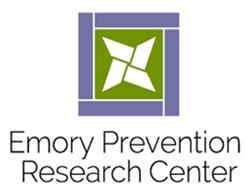Emory Prevention Research Center
Demographic(s) of Focus: adults, children, people in rural areas
Topic Area(s): tobacco use, physical activity, healthy eating, obesity, and cancer prevention, epilepsy

The EPRC work in Southwest Georgia operates through a Community Advisory Board (CAB), which represents over 15 organizations.
Introduction, Mission, and Vision
The Emory Prevention Research Center (EPRC) is one of 26 Prevention Research Centers (PRCs) supported by the Centers for Disease Control and Prevention (CDC) for the 2019–2024 funding cycle. Each PRC is funded to establish and maintain its center and to conduct a core research project. PRCs may receive supplemental funding to conduct additional research projects and activities.
EPRC’s mission is to prevent cancer and other chronic diseases and to promote health equity in rural Georgia through community-engaged research. It works to improve the lives of Georgia residents by developing and testing innovative interventions, evaluating promising practices, and training health care practitioners on evidence-based practices to prevent cancer and other chronic diseases.
Core Research
Each PRC uses a community-engaged approach to conduct one primary applied public health prevention research project called a core research project. Project activities include design, development, implementation, evaluation, and dissemination. PRCs use at least 50% of their CDC funding to conduct the project in partnership with communities.
Healthy Homes/Healthy Families

Healthy Homes/Healthy Families helps families create a home food environment that promotes healthy eating and weight gain prevention.
During the 2014–2019 funding cycle, EPRC worked with community partners in south Georgia to develop an intervention called Healthy Homes/Healthy Families and test it among patients of Federally Qualified Health Centers. The intervention uses coaches to help families change social and physical aspects of their home environments to make them more supportive of healthy eating and weight gain prevention.
Coaching was done through in-home visits and telephone calls and supported with two tools—a tailored Home Food Environment Profile and a menu of Healthy Actions. To assess the intervention, researchers conducted telephone interviews at various intervals. The assessment found that participants made significant changes to their home environment and food behaviors as a result of the intervention.
For the current funding cycle, EPRC’s core research project expands the Healthy Homes/Healthy Families intervention by partnering with United Way 2-1-1 call centers in four Georgia cities: Albany, Columbus, Macon, and Atlanta. It focuses on residents in these cities who have previously called 2-1-1 for help with everyday challenges.
For the new project, all coaching is done through telephone calls and text messages, and the intervention is shortened from 16 weeks to 12 weeks. Researchers will assess whether the intervention will still be effective if it is delivered for a shorter time and only by telephone.
Additional Research
PRCs may receive supplemental funding to work on additional research projects each funding cycle. These Special Interest Projects (SIPs) focus on a variety of health topics or gaps in scientific evidence. PRCS can also conduct additional research as part of SIP Thematic Research Networks, which are groups of PRCs working together on related health topics.
Go Sun Smart at Work: A Sun Safety Program for Underserved Outdoor Workers
This SIP will adapt Go Sun Smart at Work (GSS@W), an evidence-based occupational skin cancer prevention intervention, to increase its potential for dissemination to the ethnically diverse, under-served population of outdoor workers and their employers in Georgia.
Examining Approaches to Improve Care and Management of People with Lupus
This SIP seeks to identify prevention research topics that can help researchers find new ways to improve the care and management of adults with lupus.
PRC Vaccine Confidence Network (PRC VCN)
In April 2021, CDC funded a 12-month award to all 26 PRCs to form the PRC VCN in support of the agency’s Vaccinate with Confidence strategy for COVID-19. As part of this network, EPRC is examining vaccine hesitancy to find ways to promote vaccine confidence, increase vaccine uptake, and reduce disparities in 24 counties in southwest Georgia, focusing on non-Hispanic Black and rural residents. The goal is reduce the incidence of COVID-19 in the United States.
For its Vax Up! Southwest Georgia project, EPRC will train “natural helpers” to deliver educational outreach, schedule vaccination appointments, follow up with community members, and document their work.
Effect of Survivorship Care Plans on Cancer Mortality
This SIP surveys childhood and adolescent cancer survivors diagnosed before age 20 and treated at Children’s Healthcare of Atlanta. The goal is to estimate how survivorship care plans affect survivors of all types of childhood cancers and from diverse racial and ethnic backgrounds.
Quantifying the Burden of Epilepsy Using Novel Data Sources
This SIP estimates how epilepsy affects worker participation, quality of life, health care use, and outcomes among nursing home patients.
Managing Epilepsy Well 2.0 (MEW) Network Coordinating Center
The MEW network works to improve the health and well-being of people living with epilepsy by developing self-management programs they can use. This multisite initiative combines research, evaluation, and program dissemination.
Cancer Prevention and Control Research Network (CPCRN) Member
As a member of CPCRN, EPRC translates evidence-based cancer interventions and evaluates interventions designed to increase the rate of human papillomavirus vaccinations in southwest Georgia clinics.
Evaluating Community-Clinical Linkage Interventions in the National Breast and Cervical Cancer Early Detection Program
This SIP evaluates interventions used in CDC’s National Breast and Cervical Cancer Early Detection Program. It includes a review of the implementation, cost, cost-effectiveness, and scalability of community and clinical links designed to increase screening completion rates in medically underserved women.
Assessing the Lifetime Economic Burden in Men with Metastatic Prostate Cancer
This SIP assesses the cost of metastatic disease to determine the value of interventions to prevent, detect, and treat prostate cancer.

Location: Atlanta, Georgia
Principal Investigator: Michelle C. Kegler, DrPH
Deputy Director: Lucja T. Bundy, MA, EdM
Email: deborah.stephenson@emory.edu